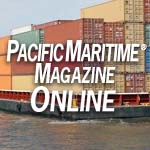Los Angeles Mayor Eric Garcetti, who announced the agreements earlier this month, had been involved in talks between the two parties since April. The agreement comes after many months of negotiations over the automation of Pier 400, the port’s largest terminal.
“In Los Angeles, we know that if we don’t guide the future, workers and communities can be left behind,” Garcetti said. “This workforce training program will ensure today’s waterfront workers are equipped for tomorrow’s jobs and continue to support the harbor community. I will never stop fighting to preserve good, middle-class jobs and protect the hardworking women and men who power our economy – and today’s agreement is a start, and not an end, to our work.”
The creation of the workforce training program will help boost the skillset of up to 900 registered longshore workers and mechanics. The agreement between the ILWU and APM Terminals “calls for the ILWU mechanics to begin familiarization and training of the new APM equipment in the coming weeks as it begins a modernization project on its terminal.”
Meanwhile, APM Terminals will postpone additional automated-related projects until at least July 1, 2022, according to the port. Los Angeles Councilman Joe Buscaino, whose district encompasses the port and San Pedro, proposed the Blue Ribbon Commission, which intends to look at the automation issue and future work at the port. The commission will make recommendations to the City Council.
“This agreement calls for a comprehensive, fully-paid training program to re-skill and up-skill longshore workers to equip them for the next generation of work on the waterfront,” said Pacific Maritime Association CEO Jim McKenna. “This will help longshore workers prepare for the port jobs of the future.”

